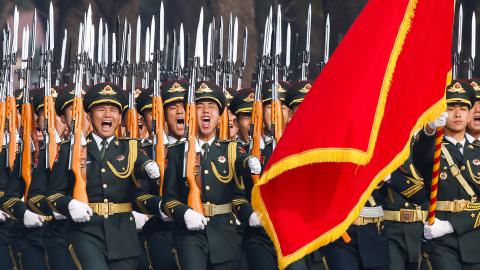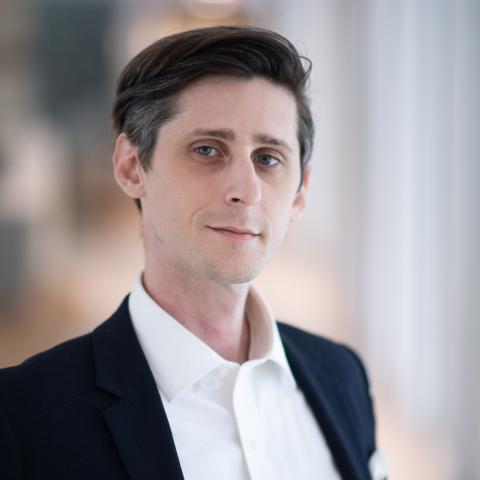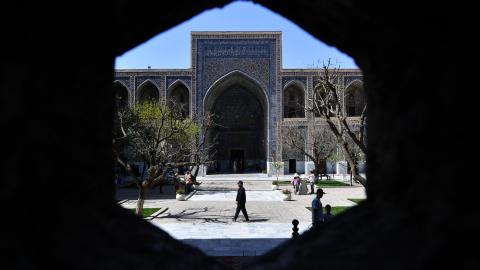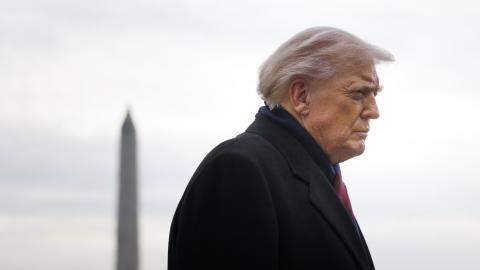In this week’s episode of China Insider, Miles Yu reviews the recent mass-purge of nine high-level People’s Liberation Army (PLA) military officials and Politburo members, and the impact of Xi Jinping’s continued military centralization on the PLA’s warfighting capabilities. Next, Miles details the life and career of Nobel Prize–winning physicist Dr. Chen Ning Yang, and the formative role he played in supporting the Chinese Communist Party’s United Front strategy. Finally, Miles covers the latest dialogue following China’s announced export controls for rare earth minerals, and responds to criticisms related to the important role of hawkish rhetoric in the United States–China strategic competition landscape.
China Insider is a weekly podcast project from Hudson Institute’s China Center, hosted by China Center Director and Senior Fellow, Dr. Miles Yu, who provides weekly news that mainstream American outlets often miss, as well as in-depth commentary and analysis on the China challenge and the free world’s future.
Episode Transcript
This transcription is automatically generated and edited lightly for accuracy. Please excuse any errors.
Miles Yu:
Welcome to China Insider, a podcast from the Hudson Institute's China Center. I am Miles Yu, senior fellow and director of the China Center. Join me each week for our analysis of the major events concerning China, China's threat, and their implications to the US and beyond.
Colin Tessier-Kay:
It is Tuesday, October 21st and we have three topics this week. First, we discuss the latest round of CCP purges targeting top PLA generals as Xi Jinping continues to centralize power across China's military leadership. Next, we observe the passing of Dr. Chen Ning Yang, Nobel-winning physicist, and the impact his passing will have on the current CCP United Front strategy. Lastly, we follow up on our rare earth conversation from last week and expand on the larger implications of economic dependence on China and the role hawkish rhetoric and policy plays in the dynamic. Miles, great to be with you again this week.
Miles Yu:
Very glad to be with you again, Colin.
Colin Tessier-Kay:
So, up first today, the Chinese Communist Party continued the purge campaign across the PLA’s high-level leadership. This time, dismissing nine officials in one of its largest public maneuvers in recent decades. The allegations focused primarily on financial crimes, and all nine officials were key members of the decision-making central committee. Miles, to start us off here, catch us up with this latest round of purges. Who were the nine officials? Which PLA branches were affected? And what was the motivation behind this large-scale dismissal?
Miles Yu:
This has almost become a habit to talk about the Chinese Communist Party's purges of military leaders. It's a recurring event which really retested the fact that it is not really about corruption. It is either corruption is so pervasive that everybody is corrupt. And then number one, even if those people were corrupted, and you can say that they were corrupt, but you just handpicked them; Xi Jinping just handpicked them recently. I mean, what does it say to the obey, right? So it's basically this whole charge of corruption against those nine senior officials doesn't really sort of carry the water. So I think what it is, it's an internal struggle and a power grab. I'll explain a little bit later, but you also have to keep in mind that China is not really a capitalist society like the United States, where money reigns supreme. In China, money is only secondary.
What is really most important is power, the monopoly of power. The Chinese Communist Party already has a monopoly of power. So that's why once you are in a position of power, you don't really stockpile a lot of cash or money. That's really secondary because once you have power, you should have everything. Because China is a socialist country. The party owns all that they call the means of production. So basically, the national resources. So that's why I'm saying that the corruption charges little bit hollow and disingenuous. You mentioned these nine officers, most of them are loyalists. He promoted them in his reign to what the equivalent to four stars in the United States military. There were the highest-ranked officers, two of them: General He Weidong and Admiral Miao Hua. They were not just members of the central committee, which is about like 200 people. He Weidong was the vice chair of the CMC China’s (Central Military Commission).
That's the highest command authority of the People's Liberation Army, chaired by Xi Jinping himself. So he had two Vice Chairs. He Weidong was one of them. This guy is a combat veteran. He was the Eastern Theater commander who would be responsible for any of Taiwan's military operations, and the current Eastern Theater commander was also sacked among the nine. And then most telling is that the newest rocket force commander was also sacked. So this is very, very bizarre. Now General He Weidong is not only a member of the central committee, but he is a member of the Politburo. Some twenty-some people. This is really the highest political echelon structure. So that's why this is very telling, why there's this case, there are many interpretations. I think the most likely scenario is that Xi Jinping set up this Vice Chairman structure in a very unusual way throughout history.
There are two Vice Chairmen under the Chairman, who is basically the party's Secretary General. Normally, Xi Jinping himself, one of them, will be designated to be in charge of political affairs. In other words, the top commissary. The other one will be in charge of what the Chinese call military construction, that is, the military affairs operation side. Now, Xi Jinping has come up with fancy ideas. So when he, during the 20th Party Congress, reconstructed the CMC, he appointed General Zhang Youxia and General He Weidong, generals both, as Vice Chairmen. The problem is that both of them were combat operation-oriented kind of officers. So obviously, there's sort of a competition for supremacies for a favorite from Ji Jinping because both of them are pretty much doing the same thing. There are professional militaries that neither of them is really of the political background of being a commissar. So that's really the problem. I think general and general He Weidong and General Zhang Youxia sort of when they plans some military operations, they must have some clash and because this is their shared core competence He Weidong of course was backed by Miao Hua who is the chair, the chief of the political affairs department of PLA, which is a very, very important position in charge of promotion and other political loyalty job.
This is the handpicked - the most loyal to Xi Jinping himself. He was sacked. Now people say, well, maybe somebody else outside of the CCP is sort of reducing Xi Jinping’s power; therefore, Xi Jinping’s position is in danger. I don't think that kind of interpretation really makes any sense. The most likely scenario, most likely case is that General Zhang Youxia feels squeezed by the powerful combination of Admiral Miao Hua and General He Weidong. So he probably went to Xi Jinping and said, ‘You know what? Those two guys are so powerful, they are sidelining you as the Chair of the CMC.’ That's basically what it is, so Xi Jinping listens to Zhang Youxia. Therefore, he has to really sort of reduce the power and impact and the inference of the very General officers he promoted. So I think this is basically follows the logic of the PLA, which makes much more sense. Speaking of logic, it is also the Communist Party’s logic to constantly weed out what they call the traitors and those disloyal to the party, because without this kind of purge, the communist party would not become the Communist Party.
This is what they call the dialectic process of the purification of the party. And the problem is the Communist Party, in order to survive and thrive, they must have the enemy external and the internal, and sometimes the line becomes very blurred because once the obvious, conspicuous external enemies were eliminated, what do you find? Well, you find that those who are close to you become suspicious and suspects, and therefore they purge. This is what happens throughout the Chinese Communist Party history. You look at all those guys who were purged by Mao during his days, most of them were handpicked by Mao and the most loyal to him that including Marshal Lin Biao and Marshall Peng Dehuai, all those guys were diehard loyalists. So this in our words, it's basically a perfect logic of an inner circle struggle, power grab, and international fight. As I say, the Chinese phrase nei juan (内卷) could roughly translate as internal torment. That's basically what it is.
Colin Tessier-Kay:
Yeah, there's almost like - eventually, they might run out of opposition or enemies to put on the other side of this. So obviously, we have the auspicious timing of this recent purge amidst the upcoming [fourth] party plenum, and also on the tail-end of the recent 80th anniversary celebrations of World War II victory over Japan, which indicates this move is largely political despite the criminal allegations here. But I'd like to pick on one of the nine officials dismissed that you mentioned. General He Weidong, considered the most prominent ranking official in the PLA after Xi, like you mentioned, the last we saw of him was back in March, and we covered it then here on China Insider. So perhaps not as surprising to see this come out now, but I would like to ask you, Miles, about the impact on PLA leadership here. With Weidong now out of the picture, who else is left among PLA leadership in a decision-making capacity that we should look out for potentially making an appearance at the fourth plenum?
Miles Yu:
Well, I don't think it really matters that much right now, you have two billets as a vice chair of the CMC, one is vacant. So this is what is going to be the task of the upcoming, actually, the ongoing planning, a fourth planning of the 20th party in Congress. So they're going to put somebody in there, but I think that person is not going to be significant. Almost exactly the same pattern when Xi Jinping purged the previous defense minister Li Shangfu and replaced him with somebody called Dong Jun, who's the admiral from the Chinese Navy, who's not even a member of the central committee. So he's nobody. So, in other words, Xi Jinping is going to decrease the role of the combat officer's command and increase his own role as a supreme leader of not only political affairs but also military affairs. His fiscal policy repeats the same strategic blunder that Adolf Hitler, Joseph Stalin had gone through. That is, they centralize their power in military decision-making into their own hands. None of them is really a military genius in my view. So that's basically the problem. You know what the revolution devours its own children, and the devouring shall not be televised. So that's basically what's going on inside China.
Colin Tessier-Kay:
That's a perfect way of putting it. And to round out this topic for right now, there was an interesting assessment made by Neil Thomas at the Asia Society Policy Institute who noted that under these purges, the PLAs functional operations are more streamlined and complicitly obedient perhaps, but also make the structure more “brittle” with so much consolidated at the top and Miles, I'd like to round out this topic with your perspective here. Xi Jinping is obviously not a military mind, kind of building off what you just said, so what impact do these continued purges have on the PLA's ability to conduct effective warfare operations? Wouldn't this potentially weaken the credible threat of a cross-strait invasion or in any Indo-Pacific conflict?
Miles Yu:
Well, one of the most direct impacts on the PLA combat strength obviously is the fear instilled throughout the entire rank and file because nobody wants to really take any risk by doing something innovative, making individual decisions for fear of being sort of picked up by Xi Jinping as another target of the purges. So this will make the Chinese military far less innovative or far less mobile and flexible in encountering the constantly changing battlefield situations. So I think this is basically the fear that is probable throughout the entire Chinese military hierarchy. Look, these guys were not just the top leaders because the Chinese military system is full of - replete with factionalism - political lineage is very important. So if you serve as the commander and you promote people down your own line of lineage, and then that's basically what happens once you are done, and the entire lineage will be purged. So that's why this purge at the very top will have a devastating impact on the ranks and file of the People's Liberation Army troops.
Colin Tessier-Kay:
Moving to our next topic today, a Nobel Prize-winning theoretical physicist. Dr. Chen Ning Yang passed away this weekend in Beijing at 103 years old. For any of our listeners who are unfamiliar, Dr. Yang and his colleague Dr. Tsung Dao Lee were made famous for their 1956 challenge to the principle of conservation of parity, essentially a way of saying that a phenomenon and its mirror image should behave precisely in the same. This is all certainly over my head, but Dr. Yang had a very interesting life between his time in the US attached to scholars of the Manhattan Project and in US academia, and then later on in his life in China as well. So Miles, maybe you can start us off here with some of his background and the significance of his passing.
Miles Yu:
No, I don't think that Dr. Yang was involved in the Manhattan Project; that's somebody else. I think you meant to say Dr. Lee Tsung-Dao, who went back to China after the People's Republic of China was established in the 1950s. Dr. Chen Ning Yang was somebody who was born in China and came to the United States to study at the University of Chicago under the famous nuclear physicists at the time, Dr. Fermi and Dr. Taylor. So afterwards, these two basically went on to win the Nobel Prize for physics in 1957. Along with him was his colleague, who worked together later on in Princeton and discovered some kind of atomic particle. And that's Dr. Lee what you just mentioned in passing, Lee Tsung-Dao, that's his name, and who was a long time, been a long-time professor at Columbia. So these two, at the time, were very young. Dr. Yang was 35 years old. Dr. Lee was even younger, 31 years old.
So those were like the young geniuses of the time; they were the first Nobel Prize winners of Chinese descent. But to be honest, the older accomplishment was done and was made possible by the United States. So they were basically a product of the American system. So however, Dr. Yang and Dr. Lee had a terrible fallout, and this too basically became dire enemies in academic politics. The viciousness of the politics can be revealed through this two peoples personal relationship. They wrote a lot of articles stronger than both, won the sheer Nobel Prize in 1957, and accused each other of fraud and personal attacks. Just a really, really sad situation. However, while Dr. Lee maintained his academic and political integrity and was in Columbia and doing a kind of very constructive work, Dr. Yang turned himself into nothing but an opportunist. I mean, this is a really, really personal story. If you're a person living in the Chinese language arena, you'll understand what kind of person Dr. Yang was.
And during the height of the Chinese Cultural Revolution, which was a catastrophe, Dr. Yang was invited by the Chinese government, and he visited China in 1971. This is at the height of the Chinese political binge of destruction. Dr. Yang went to China, and he saw the future of the world, and he prayed for all those villages. There's one thing called the commune, called he came back to the West and the incredible socialist accomplishment of China, and which basically became China's sort of a mouthpiece and proxy in the West. In 1973, Chairman Mao rewarded him with a meeting with him, and he went back, came back to the United States, and told everybody, particularly the Nixon administration, how wonderful Mao was. This guy really had a scientific spirit. Mao ruled China with science, with a scientific approach. This is all of course, nonsense, but Yang was the pioneer in promoting this kind of government in the West.
And so in 1977, China wanted the United States to recognize the People's Republic of China dramatically so Yang in 1977, spent $8,000 of his own money and put a huge ad in the New York Times urging the US government to recognize China. Of course, two years later, the Carter administration did just that. And then in 1978, Chinese Supreme Leader Deng Xiaoping came to the United States, and they put in other ads and organized all kinds of welcoming activities for Deng Xiaoping. And then Yang retired from the State University of New York in Stony Brook, where he had been a professor for a long time most of his life. And he moved to China. While in China, his personal fortune made a huge turn. It kind of twists in a way. And he went to China, where China treated him as if he were Einstein reincarnated. And he taught at Tsinghua University and was given more honorary titles. And then in 1996, he spotted a 19-year-old Chinese college girl, and he was absolutely mesmerized by her.
Eight years later, at the age of 82, Dr. Yang Chen Ning married the college student he had met eight years before. And at the time, that woman, Mr. Weng Fan, was 28. So he is 82 years old, married 28 a 28-year-old young girl. And that's basically the top of talent at the time. So he will be forever remembered in China as an old guy sort of a hitch with a young Chinese woman, and he died last week at the age of 103, the Chinese state media ran top gear. This incredible scientist in my view, was a good scientist, but he didn't do much. There were about a dozen Nobel Prize winners of Chinese descent. So he's not the only one, but he'll be forever remembered as a political opportunist and as a US citizen who moved to China, renounced his citizenship, and became a very, very ardent defender of the Chinese Communist Party.
One very interesting note is that in his 1957 Nobel acceptance speech, Dr. Yang Chen Ning made a very powerful speech denouncing Chinese cultural backwardness. He used the Boxer Rebellion of 1900 as a supreme example of xenophobia, which is the reason why Chinese science had not advanced. Now, later on, he became a fanatic, Chinese ultranationalist. In 1988, there was a very powerful documentary called The River Elegy. The River Elegy was urging the Chinese government to reform political reform and they use the image of Boxer Rebellion, a image of the Great Wall to show to the world that the real reason for Chinese backwardness in 1988 was because China's autocratic despotic tradition using the Great Wall of China as a symbol of Oriental Despotism, one emperor could utilize the entire nation resources to build such a useless project. Grand use, yes, but it is really for the great cause of the nation. Dr. Yang Chen Ning came out to vigorously denounce the documentary River Elegy and defend the Boxer Rebellion, defending the symbolic meaning of the Great Wall. And so he basically, in my view, this guy had very little integrity.
Colin Tessier-Kay:
It's all really great historical analysis, considering that he had quite the career once he had transitioned back to China. And it seems around 1971, that's really when he began to rekindle those relationships and started out in Hong Kong and then later worked his way back to Tsinghua University in Beijing. And like you mentioned, this shortly thereafter coincides with a lot of the modernization movement under Deng Xiaoping. So Miles to round this out, I would like to hear what role did Dr. Yang play in the foundations of Chinese society upon his return and what would eventually become what is now known as the CCP's United Front? And I guess from here now losing him as part of the process, is this a significant loss to the United Front strategy, or is this something that his legacy might actually impact in a more beneficial manner for the CCP?
Miles Yu:
I think Dr. Yang's usefulness for the Chinese Communist Party expired a long time ago. I mean, he's just a symbol of somebody who's pro-China overseas, and China right now cultivated somebody of far more use to them. That is basically the American political proxies. We mention Henry Kissinger all the time, but it is really the political elite who have the intrinsic connections in the corridors of political power in the West, not just in Washington, in London, in Paris and everywhere. So the United Front is a very comprehensive inference, pedaling, proxy cultivating project. I think Dr. Yang, after he married this young woman, his usefulness is pretty much gone.
Colin Tessier-Kay:
Turning to our final topic for today, we covered the recent export controls imposed on rare earths by the CCP in last week's show. And the subsequent economic analysis has spanned quite the spectrum of criticism and potential for how the US has responded since one individual that chimed into the conversation was Nvidia CEO, Jensen Huang, who said in a recent interview, and I'm quoting from a Wall Street Journal op-ed here, that “While some Americans wear the label China hawk as a badge of honor, it really is a badge of shame,” and he went on to say “it doesn't have to be all us or them, it could be us and them.” So Miles, as someone keenly positioned in the China watcher community and with your policy background here, I'd love to get your reaction to the initial statements and why this particular dialogue on a larger scale matters to US China policy.
Miles Yu:
Jensen Huang speaks only for himself. He is a very small minority. I mean, in media, he wants to march into China to occupy markets, and everybody, every company, major company in Silicon Valley, his own sort of community is getting out of China. Now Microsoft, Amazon, Google, I mean, they're trying to get out of China. Even Apple is considering plan B, right? So Jensen is the only Silicon Valley leader who is championing, sort of, a cancellation of the export control. I mean, he labeled the China hawks as a badge of shame. This is even more bizarre because he implies and expressly, I would say, that all the current US-China spat over technology export control is a result of China hawks. It has nothing to do with China hawks ' response to China's egregious policy. So it is the Chinese government's behavior that caused Jensen Huang’s problems in China.
So I understand he has a business interest, but a business interest is totally different from national interest. American national interest demands the separation from American's high-tech innovation technology from the Chinese Communist Party's control domestic market. So I don't think he even called this a China hawks, so to speak, unpatriotic. That's even bizarre if somebody does not really align their business interest with the Americans' or national interest, that is basically the classic definition of unpatriotic. So this is kind of bizarre. I don't take his remarks very seriously. As a matter of fact, after he made those remarks, he faced an avalanche of criticism. However, it does have a sway, has some impact upon the decision-making circle in Washington, DC That's why I think his views have to be rebutted, and it's not really that easy to do. It's not difficult to do, I should say.
Colin Tessier-Kay:
Yeah. And our listeners may certainly be more keenly aware of the ongoing strategic competition that would most certainly contradict the sentiment that we are not in a conflict with China, which is more of what the comments were insinuating there, or at least a potential hope that there wouldn't be an eventual conflict. But in your mind, Miles, I kind of want to broaden this out more to the importance of this rhetoric within the dialogue between how the US should approach China and I guess with an assessment of the current landscape. In your mind, what are the biggest examples of China positioning for a potential long-term conflict with the US, and do you think China wishes to escalate the conflict regardless of how the US may choose to approach bilateral relations going forward?
Miles Yu:
Yeah, I mean, China's attitude, China's grand view on the United States has very little to do with the US policy, either hawkish or dovish. It is the very existence of the United States itself that the Chinese government has a problem with. That's why everything they were trying to do is to destroy and dismantle American leadership on the globe and to wipe out America's competitiveness, to reduce American industry, and even limit American industrial capabilities so that China would present a totally different model of governance to replace that created and championed by the United States since World War II. So this is China's grand strategy, and one key pillar of Chinese grand strategy is the global dependency on Chinese technology. Chinese technology, of course, is focused not on the legacy technologies, but on the new frontiers, particularly in the very area that Jensen Huang is very good at, right?
Artificial intelligence and cyberspace, those areas are very important. So Chinese basically are very good at controlling the narrative. Unfortunately, people like Jensen Huang fall into the kind narrative and which is not very helpful, and particularly he's wrong. And China, you've ordered to do business, particularly Americans, technology-rich firms go to China, either Google, Yahoo, Microsoft, every company has tried to penetrate China for the last 34 years. Every one of them came out bruised and wounded and disenchanted in China because the Chinese government's approach is that you want to do business in China, fine, but you have to really surrender, surrender technical, your secret, your code, your trade secrets, right at the price of having a place in the Chinese market. So I think that's the problem, and that's not real cooperation. It's very naive, even laughable, to think that, okay, China is just like an open market like anybody else.
If we're not there, China will basically dominate the market. Whether you are there or not, the Chinese government is going to dominate the market because you are not welcome. You can only be used in your technical technology and for China's long-term dominance, that is basically what it is. Now, having said that, I think Mr. Huang that the export control has reduced NVIDIA's presence in the Chinese market from 96% to 0%. He said that's a terrible thing. I think that's a great thing because imagine if Nvidia still commands say 96% of the Chinese market, that's going to only enrich the Chinese Communist Party. It's tools of repression, it's tools of aggression. So I don't think that's a good thing. That is a very unpatriotic thing in my view.
Colin Tessier-Kay:
And to kind of bring this out to a close here for today, I'm kind of curious to hear on the future landscape in your assessment here, we're talking mostly within the technological sphere, the advanced capabilities, particularly as they apply to dual use, both civilian and military applications. I guess looking out towards the future of this landscape, Miles, is there one side with kind of a clear advantage within that domain specifically, and what is your current assessment of US policy to sort of set up a long-term national security interest to be able to respond to changes in that landscape?
Miles Yu:
I think President Trump was right when he said that the Chinese market must be open, and secondly, China must reciprocate American goodwill. Trade essentially is based on transparency and reciprocity. If China imposed high tariffs on the United States, we should respond. If China does not really recontrol its export of precursors to fentanyl production in Mexico and Canada to a certain degree. And the United States has its own right to impose tariffs, Chinese products and not just a matter of national interest. Right? Now, business interest is related to national interest, but business interest is not the same as national interest. Sometimes they overlap; a lot of times they don't. So in this case, in the Chinese US sort of strategic competition, I think a business interest and national interest in many cases actually do not overlap. That's why national interest is very important. So I think all the Silicon Valley firms should really keep this point in mind, and Chinese market, you may gain short-term benefits in the long term. It's suicidal.
Colin Tessier-Kay:
Well, I think that's a great place to leave it off for this week's conversation. Thank you to our listeners for joining us again this week. And thank you, Miles, as always, for lending us your expert insight and analysis on these critical issues. Looking forward to next week's discussion.
Miles Yu:
Alright, see you next week.





















